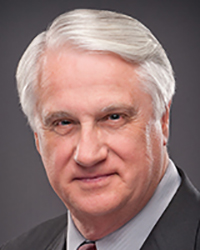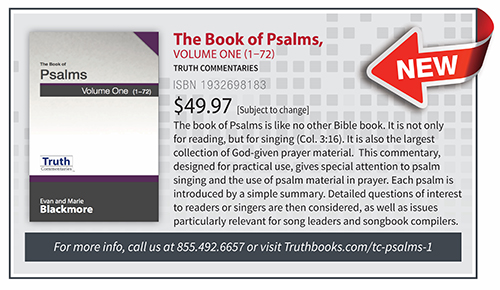

by Daniel H. King, Sr.
Synopsis: The theme section of the January issue of Truth Magazine offers several reviews and personal reflections on the 2017 Exploring Current Issues Conference (ECIC). This is a private Bible study hosted by Jim Deason that has been conducted in Cullman, AL since 2011. This year's study focused upon the similarities and differences between institutional and non-institutional churches of Christ.
It was an honor to be invited to Cullman, AL and enjoy several days with a good number of brethren from all parts of the country and from various perspectives on the questions the answers to which have alienated and severed fellowship among many disciples of Christ for over fifty years. I want to thank Jim Deason in a public way for all the hard work and sacrifice on his part to bring this meeting into being; also for his considerable abilities as a moderator in keeping it on track and civil in nature. Frankly, I consider it to be the most productive and brotherly meeting of this sort that I have ever attended, and much of that is owing to Jim Deason and his approach to his job as moderator.
Some readers will already know that my own life as a gospel preacher began on the other side of these questions, being that at the time I was considering preaching as a life choice my family was affiliated with an "institutional" congregation, not knowing that such differences existed. We hailed originally from a rural area with a small group of saints who were not at all involved in matters related to this division. When we moved to the city, that is where the fire-works began! Interestingly, even though we left that Detroit-area congregation before I went off to college, it was not with any hard feelings or bitterness at all. We were just one family that needed to find another church more in line with our understanding of what the Scriptures taught.
I am glad that we did not experience some of the injured feelings and abusive relationships that some have told us about through the years. For some people, this whole era was best forgotten. For us it was different. Those brethren simply had a different understanding of certain matters than we did, and so we found a church that was more conservative in its approach to and application of God's Word. It was painful to have to leave them, but we believed that some of the practices that they were integrating into the life of the congregation were destructive to the divine purpose of the church. So, we found a group that looked more like a New Testament church and less like a social club. Nevertheless, my parents stayed in constant contact with several of those people until many of them died of old age, and considered them dear friends throughout life.
At the time of our separation, I had already chosen David Lipscomb College as my destination for higher education and saw no reason at the time to change that. After all, we were from Tennessee, and I wanted to go back home. I knew nothing of Florida College until several years later. So, for me this meeting represented another chance to hopefully make some new friends, since that generation who bore the brunt of the division have mostly passed away, and learn from others what their thoughts and experiences were like, hoping all the while that we might be able to draw closer in love and appreciation for one another and work toward a fuller comprehension of what the Bible teaches on these things.
My view is that, even though there were some instances where strong feelings were expressed, and voices were raised a few decibels, the discussion was generally brotherly and respectful. None of us is any less passionate about these matters than we have been through-out the years, but it is encouraging to be able to talk to one another calmly with obvious love for one another, and feel that the other fellow may actually be listening for a change, rather than merely trying to think of an argument to make in response. Clearly, that was often the case. Thus, in general, I came away feeling good about the meeting.
Of course, I was a bit sad that this alienation cannot be put away entirely and relegated to the dustbin of history, but some things cannot be worked out in a few short hours or even days of study. I pray that over time things will improve, and the Lord's work may go forward without the hindrance of these divisive matters causing us to go in different directions. All of us know that it is not the will of Christ that we should be divided (John 17:20-21). We are fully aware that the Lord wants us all to speak the same thing and that there be no divisions among us (1 Cor. 1:10). We are all conscious of the fact that division is a sin and a sure sign of spiritual immaturity (1 Cor. 3:1-3). We want to go to heaven, and anything that prevents that from becoming a reality needs to be eschewed.
The new editor of the Gospel Advocate, brother Greg Tidwell, is a breath of fresh air; and at the meeting, he displayed a generous disposition and a compassionate perspective toward all of us. He has made kindly gestures in our direction and has used some of us as writers since becoming the new editor. This was not my first meeting with him, and each time I have come away with a positive impression of him as a man and as a Christian.
One thing that was noteworthy at the gathering was the very obvious absence of the "progressive" element among these brethren. Apparently, the division between the more conservative ones and those radical libertines in their ranks is now virtually complete. In earlier meetings (in Nashville and Dallas) this was not the case. The progressive, ultra-liberal preachers were conspicuously present, and certainly shocked some of their own brethren with their outlandish formularies. But now, that contingent of liberal wayfarers has gone off in a totally sectarian and denominational direction. In the meantime, they have captured most all of the larger congregations and are taking them down the road toward the use of instrumental music in the worship, choirs and experimental worship, women preachers and church officials, community-church shenanigans, theological modernism, etc. We certainly have much more in common with these brethren now than was ever the case when they remained in fellowship with those clueless pilgrims. They are now quite obviously alienated and separate, and many of them are still clearly smarting from the experience.
But even though they have taken most of the large churches, they were unable to capture the Gospel Advocate. That is a most fortuitous and fortunate development! The new owners of the Advocate are Randy and Jodie Duke. Randy was present at the meeting and spoke in a most conciliatory and brotherly fashion. He is a younger man, like brother Tidwell, and seems not to have any of the residue of hostility or anger that has sometimes characterized those whom we have encountered on that side of these questions. Each time I have met and spoken with him, I have felt like a brother in Christ speaking to a brother in Christ. He has never shown an air of superiority or demonstrated an attitude lacking in humility or brotherly kindness. I am personally very impressed with the team of owner and editor. They have shown considerable "class" and bear the mark of what I would call "good raising." Their parents should be very proud of the Christian men they have grown up to be.
In sum, I am quite excited about what the future could hold for us all. Now that the most revolutionary wing has made its way almost fully into the twisted world of denominationalism, a good number in the group with which we have the most in common has come to recognize our considerable commonalities and is willing to discuss our differences in a spirit of brotherhood and comity. There is no way that this could be considered a bad thing. So, even though we still have some important differences, I am hopeful and encouraged. I believe that we all ought to be.
Author Bio: Daniel H. King, Sr. preaches for the Locust St. church of Christ in Mt. Pleasant, TN. The church website is lscoc.com. He can be reached at danielhking@hotmail.com.
